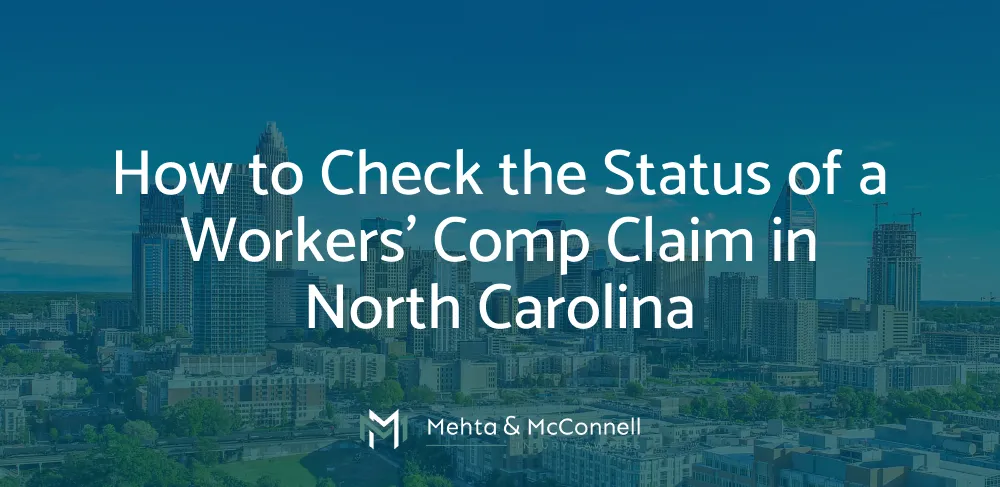 Workers' Compensation
Workers' Compensation
Waiting to hear the results of a workers’ compensation claim can be emotionally and physically agonizing for employees. Workers’ compensation aims to give employees efficient and affordable access to medical care when injured on the job. In reality, many workers must wait weeks or months in limbo for a decision.
In this blog post, we’ll explain how to check the status of a workers’ comp claim. We’ll also answer common questions about workers’ comp and explain what to expect once a decision is made.
North Carolina Workers’ Compensation Timeline
Several important deadlines govern North Carolina’s workers’ compensation claim process. Staying on top of these deadlines can help reduce issues that could delay a decision on your claim.
1. Tell Your Employer You’re Injured
Legally, employees injured on the job must inform their employer no more than 30 days after the injury if they want to seek workers’ compensation. It’s best to tell your boss immediately when you sustain an injury. If you cannot communicate with them directly, you can have a coworker or family member let them know. Before the 30 days expire, you should also send your employer written notice of your injury.
2. Employee Files Notice of Accident Form
An injured employee must complete and submit a Form 18 to the North Carolina Industrial Commission (NCIC). After learning about your injury, your employer should give you a blank version of this form. Completing the form also officially initiates your claim for workers’ compensation with the NCIC. Employees should file Form 18 within five days of notifying their employer of an injury.
3. Employer Files Report of Injury Form
Employers must report an employee’s workers’ comp request to the NCIC and their insurance company using a Form 19. The deadline for filing Form 19 is also five days after learning about an employee’s injury.
How Do I Know If My Workers’ Comp Claim Is Approved?
If your claim is approved, you could get the news from your employer, the insurance company, or the NCIC.
If you’re still waiting on a decision, there are a couple of ways you can check the status of your claim. First, you can ask your employer. Since your employer’s insurer reviews and handles workers’ comp requests, your boss can often contact them for information about the status of your claim.
You can also contact your employer’s insurance provider directly. An insurer may be able to help you understand where your claim is in the review process. However, they’ll likely not give you an exact day by which you can expect to receive an answer.
Another way to check on the status of your claim is through the NCIC. The NCIC’s website provides a phone number that employees can call to reach the Claims Administration Section with general questions or claim inquiries.
How Soon Do Payments Start After My Claim Is Approved?
The type of compensation you receive will determine when your worker’s compensation payments start. Compensation for medical care should begin immediately once your claim is approved.
Payment for lost wages can take a little longer. If you’ve missed work because of your injury, benefits for lost wages won’t kick in until seven days after the incident. You can only receive lost wage benefits for those first 7 days if you’ve been away from work for 21 days or more.
If your claim is provisionally approved, you may wait to receive compensation. Should an insurer want to conduct further investigation into your injury, you may have to wait to receive any payments until notice of a final decision.
What Should I Do If My Claim Is Denied?
Once you understand how to check the status of a workers’ comp claim, it’s a good idea to learn about your rights and options in case your claim isn’t approved.
You can always appeal a denied claim. Employees who want to appeal should complete a Form 33 to request a hearing with the Deputy Commissioner. In the hearing, the Deputy Commissioner will review the evidence from your case and listen to testimony from witnesses and medical experts.
However, waiting for a decision on your hearing can also take time—anywhere from six months to a year. There’s also no guarantee that you’ll be able to secure a hearing date immediately, which can mean even more waiting on needed financial support.
If you have an attorney representing you, the NCIC could refer your appeal to mediation before your hearing. In mediation, your lawyer and the insurer’s legal representative can discuss your case before a neutral third party.
In some cases, your attorney can negotiate a settlement with the insurance company, meaning you’ll receive some of the compensation you seek without waiting for a hearing.
Speak with a Board-Certified Representative Today
A lawyer can help you do much more than manage the complicated paperwork and deadlines for these claims. A trained attorney can ensure you have the documentation and detailed evidence needed to make a compelling appeal for compensation. If the insurer offers a settlement, your attorney can ensure it’s fair or negotiate for more compensation.
At Mehta & McConnell, PLLC, we understand the complexities of workers’ compensation claims from the inside. Our team of attorneys offers our clients 30 years of combined experience in North Carolina law and a wealth of insights that can only come from former insurance professionals.
We’re proud to use our combined knowledge and experience to help employees recover after an injury. If you’re concerned about your compensation claim, contact our office today to schedule a free consultation with a board-certified attorney.

